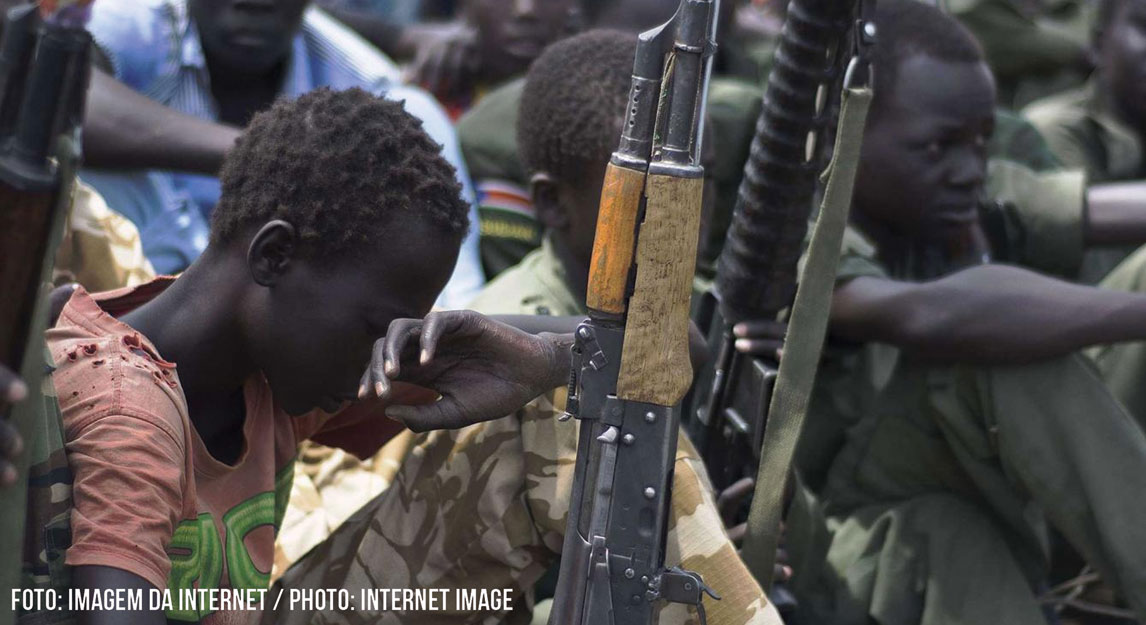
In times of COVID-19, children under violence and hunger in the Tropics
Vulnerabilities of children living in countries affected by the humanitarian crisis and poverty will persist and should increase by the consequences of the pandemic
08/09/2020
The impact of violence has become even more serious by the current pandemic. Movement restrictions due to isolation measures hampered the ability of humanitarian organizations to provide aid
While the world is united in a fight against an invisible enemy, the serious consequences that challenge the Tropics go beyond and are worsened by it. These are the not-so-hidden impacts: the drama of children under violence and hunger.
In Yemen, after five years of conflict, the crisis has reached unprecedented levels, where children struggle day after day to survive. The United Nations Childrens Fund (Unicef) has declared a state of emergency for Yemeni children, who face hunger as a result of the countrys lack of humanitarian assistance and devastation. According to the latest UNICEF report, 30 children may develop acute malnutrition, at risk of life, over the next six months; the total number of malnourished children under the age of five can increase to 2.4 million children.
A report by the United Nations (UN) points out that Yemen is returning to alarming levels of food insecurity. The pandemic restrictions, reduced remittances, grasshoppers, floods and significant underfunding related to this years aid have further aggravated the already critical famine after five years of war. However, the hunger crisis has never been officially declared in Yemen.
The violence suffered by children also draws attention. According to a survey by the International Rescue Committee (IRC), there are more reports of unaccompanied children and adolescents, as well as physical and emotional abuse. The largest number refer to southern Sudan and the Democratic Republic of Congo (DRC). According to the document, one billion children are currently facing abuse and, with the pandemic, an additional 85 million young people could be affected. Worldwide, it is estimated that 152 million children were already in child labor before the pandemic, with 73 million involved in very dangerous work.
Children forced to participate in conflicts
Recently, United Nations Secretary-General António Guterres said he was particularly shocked by the number of children killed or maimed in armed conflicts since the agency began monitoring and reporting this serious violation in 2018. More than 12 thousand boys and girls were reportedly affected, an unprecedented number.
According to the War Child organization, 75% of armed conflicts in the world have children in combat. Sudan, Somalia, Nigeria, Sierra Leone, Uganda, Rwanda, Ivory Coast, Ethiopia, Afghanistan, Myanmar, Colombia, are countries in which children participate or have participated in conflicts. Unfortunately, the number of child soldiers is increasing. According to the Save the Children s report Stop the War on Children, almost one in six children in the world lived in conflict areas in 2018, representing 415 million under the age of 18 The number is more than double that of 1995.
South Sudan, for example, suffers from one of the worst violence crises in the world and serious problems such as food insecurity, child malnutrition and diseases. The country also records countless cases of death, sexual violence and malnutrition. The conflict has had a devastating impact on the lives of children, who make up more than half of the more than 2 million South Sudanese living in exile. Violence not only takes children away from their families, homes and childhoods, but also leaves thousands of them looking after themselves. About 4,000 people flee daily from South Sudan to Uganda. It is estimated that 80 thousand South Sudanese have fled to the country since the start of the conflicts in 2013. Of this total, 85% are women and children. Whenever one faction conquers a region, those in charge devastate properties, destroy livelihoods, kill or displace as many civilians as possible.
Nine years after South Sudans independence, seven years after the start of a bloody civil war and two years after the parties to the conflict signed a peace agreement, much remains to be done in the worlds youngest country to guarantee a future safe and stable for their children and their people.
Impact of Ebola return on children in the DRC
On 17 July, the WHO declared the Ebola outbreak in the Democratic Republic of Congo (DRC) a public health emergency of international interest, an unusual term, which is only used in more serious epidemics. Unicef Representative in the DRC, Edouard Beigbeder, said that Ebola affects children in several ways, in addition to the immediate risk of infection and death, stressing the need to minimize the impact of the disease on childrens well-being. Data from Unicef show that more than 20 children, between 2 and 17 years old, went through one of the four Ebola treatment centers, with infection or suspected infection. In addition to Ebola outbreaks, the country is currently affected by other major outbreaks, such as COVID-19, measles, cholera, monkey pox, polio and bubonic plague.
In the troubles of the tropics
In COVID-19, times, the pandemic exposes even more the ills of the Tropics, which persist and advance as a metastasis across the world. The ills steal the childhood of thousands of children, childhoods that should leave them longing and sweet memories. But no, for these children, the memories will be of sadness and hopelessness, because their childhood was stolen, hidden in the dumps, at the traffic lights, in armed conflicts and in no less hard domestic work. Every day, children lose their childhoods because they are the main victims of malnutrition, disease, hunger, lack of basic sanitation and poverty. According to Unicef, 1 billion children suffer from poverty in the developing world, 50% of the entire child population in these countries. In a world full of injustices, the stolen childhood begs and thousands of children will continue in search of their lost childhoods until the end of life.










